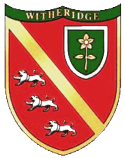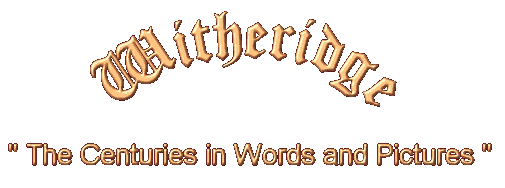

|
Along with 22 other lads from Witheridge, I joined the Territorial Army in 1938. We were signed on in the big room at The Angel, quite a few of us were just 17 so had to get our parents agreement. I well remember Joe Churchill telling the officer who was in charge of the proceedings that it was he who was the instigator of getting us to join, and that he was entitled to half a crown for doing so. I don't know whether Joe ever got his cider money, that was half a crown for each person. From then on it was drill parades at South Molton Drill Hall, picked up in the Square each Thursday evening and taken by bus. In due course we were given a uniform, some fitted, some did not. We had to wait quite a while for Army Boots, mine were a pair of black ones, which were termed as Best Boots back then. We did get a rifle each and the usual infantry equipment, which we had to blanco and polish the brasses, which in itself was some effort, considering it was ex 1914-1918. The next big event was in August 1939 a fortnight's camp at Corfe Castle, where we got to fire our rifles and do some infantry training, and a real must was learning how to salute officers. We all returned to work little knowing what would be coming September 4th 1939. We all got our calling up papers the Friday before the 4th, we were all told to gather in the Square on the Friday evening, where the officer in charge would make sure everyone was on parade, and our bus for South Molton Drill Hall. That was one order that was not carried out. Instead we all gathered in The Angel, and there we all stayed until closing time, the officer had to have bed and breakfast at The Angel and we embussed the Saturday morning. The officer's name was Lt. Gregory Jones and he told us we hadn't made a very good start at obeying orders, but he couldn't have made it himself because Mrs Buchanan had a job to wake him next morning. After picking up our kit we then went on to Torrington where we were billeted but to different families. Having stayed there three weeks the whole Battalion went on to Plumer Barracks, Plymouth. That was rather a rude awakening with the first haircut, which we had to pay for, and where we started standing to attention to anyone with one stripe and above. We weren't allowed into Plymouth for 3 or 4 weeks, not reckoned to be smart enough, and when we did go that was an eye-opener for young lads from Witheridge who were keen to explore the bright lights of Union Street. We had then started getting paid 14 shillings a week, of which we only got 10 shillings. We were told that 4 shillings had to go into a credit account to help pay for any barrack room damage there might be. Out of the 10 we had to pay for blanco for cleaning equipment, brasso, all soap, toothpaste, boot polish, haircuts and on top of that you were told that you were on duty 24 hours and any leave was a privilege. I don't think there were many people in this country at that time who were working just for a penny an hour, which was what the British soldier was getting. There was a short spell at Exmouth after Plymouth and we were then sent to Seaton, just my company; it was a holiday camp turned into a POW camp for German seamen. The estuary of the river was alongside the camp and it was so cold, and then we all didn't have army greatcoats, so the lads doing the first 2 hours on were lucky as they started with a dry coat, the next lot had to wear the coats the first lot had taken off. Most times they were really sodden, all part of Britain being ready for war. After Seaton the Battalion was put on a train and the rumour was that the next stop would be France, but Dunkirk happened and we finished up at Richmond in Yorkshire. My company were sent to an aerodrome called Lindholme, where they flew Hampden bombers; we got there at 2.30 in the morning and were given the best food we had had for ages. The RAF lads were glad to see us, because it meant they had someone to guard the bombers. We got to know all the aircrews, saw them take off and kept the cocoa hot for when they came back. Some never did, and the rear gunners would be shot to bits. The next move took us down to Sussex, a place called Pett Level, invasion was on the cards, so the first job we did was to dig foxholes in the sides of the cliff, which we manned every night. By day we laid landmines along the beach under the supervision of the Res. The Germans spent spotter planes over almost every day, and of course blew the mines up twice. Another move took us over to Essex, a place called Bradwell on the river Blackwater. What a dump! Another so-called invasion site. That didn't last too long because that's when the Battalion had to start sending drafts to other Regiments. We couldn't understand why we couldn't be kept together, and it was only after the war that I was told the reason why. At the first re-union dinner I went to, our first CO was there and he told me that there were too many lads from the same village in one unit and we had to be split up. It was there I left the 6th Devons and joined the 4th Devons for Gibraltar, the last place I wanted to be. That lasted for 12 months and then quite a few of us moved on to India, landing at Bombay and going to a large transit camp where we were put into different age groups, the youngest being told we were going to join the Chindits. By the way, the camp was called Doolali. I'd often heard the name used for someone who was reckoned to have had too much sun, never thought I'd ever go there. The next destination was to a jungle camp in the State of Bhopal. Central India as near as possible. There we were made to hand in all Khaki Drill clothing, anything white, and issued with everything green, all spit and polish obliterated, brasses painted green, boots dulled, nothing to shine at all. The training was really tough and we had to get used to dealing with mules, loading and unloading. Some of them were big South African mountain mules, kick a gnat's eye out, but we grew to respect them when the going got for real. We were under canvas, sleeping on things called charpoys, wooden frames with 4 legs and rope strung across. Every day our tents got turned over by a group of monkeys, eating everything in sight. No one was allowed to miss training to look after the empty tents. It was there I met Donald Southcott. He had to be flown out of Burma, having had malaria so many times. The time came when we were sent to the different Battalions that made up the Chindits. I was sent to the 2nd Battalion of the Leicestershire Regt, and from then on it was the long slog through that stinking place called Burma. Operating behind enemy lines is somewhat different than having them in front; there were no big weapons to back us up, and no tanks. My weapon was an American carbine, lighter than a rifle, a 15-round repeater. We had nowhere to sleep at night other than the trees and plenty of other things to cope with, malaria, jungle sores, dysentery, leeches, ticks and very big ants that bit like hell. When full your pack weighed 80 pounds, and each had to carry 5 days rations, which consisted of 15 packets of USA K rations, plus your arms, plus 4 magazines of extra ammo for the Bren gunner (each magazine held 50 rounds). When I joined the Chindits quite a few of the lads were from around the Loughborough area. I was a sergeant at the time and the first lad I spoke to wanted to know where I came from. I replied "Devon". He then said, "I thought you might". His brother had married a Devon girl from Black Dog, and was Frank Gowan's brother Stan. There were times I wondered what we were doing in such a godforsaken place, just hoping you would make the next supply drop which landed in the trees. You got to know each other so well, some didn't make it. We had a wonderful officer, Capt May, one of the Bryant and May match family, my idea of what an officer should be. Looking back after all these years I still think it was a bonus that I made it, many didn't. Besides being killed, malaria, jungle sores, and dysentery took their tool. I must mention that two of my schoolmates who were called up with me were killed in Burma. They were Freddie Hartnell in the King's Liverpool's, and Percy Chapple in the 1st Devons. I was glad when my demob came up. Number 28 group, we came home on the SS Carthage, landing at Southampton and to Leamington Spa for demob. I had to walk home from Tiverton and something that I always remembered was meeting Mrs Tidball coming out from Higher Chapel graveyard, she gave me a hug and said, "I'm so glad to see you have come home". Her own two sons had been killed. At my demob I was given £60 as my final payment after 6 years service. Starting back to work for E Hutchings was very strange, as I still had two years left to do to finish my time, before I was a full-blown carpenter, and those I had to do before I was given my certificate. My pay in 1939 was 16 shillings a week, but my first week's pay for Hutchings was 32 shillings. I was also presented with a bill for £45 for accumulated Income Tax on my army pay (British gratitude for services rendered). I then decided that no way was I going to continue working for that sort of money, but was told that although I still had two years to serve I would be allowed full rate of pay. There was no football in Witheridge at that time and I wondered where to get a game. Raymond Grant and Jim Leach were prone to having some Saturday nights in the "Black Horse" in Tiverton, which happened to be Tiverton Town Football Club's watering hole. The landlord was the Club Secretary. Ray heard him say that they could do with a good centre forward. Ray got the form and signed me on, telling me when he came to work on the Monday morning that I had the honour of being the first lad from Witheridge to play for the County. No. 5621060 Bourne L G, 2nd Battalion Leicestershire Regt. Previous Last Edited 03/07/2006 Copyright © 2000-2006 Witheridge Unless otherwise indicated on the page in question, the photographic images reproduced on this site belong to the Witheridge Archives, and, as such may not be reproduced for commercial purposes without written permission. However, you are welcome to use any of the photographs belonging to the archive for personal and/or non-commercial use. Any material shown as not being owned by the archive may not be reproduced in any form without first receiving written permission from the owner of the material in question. |

